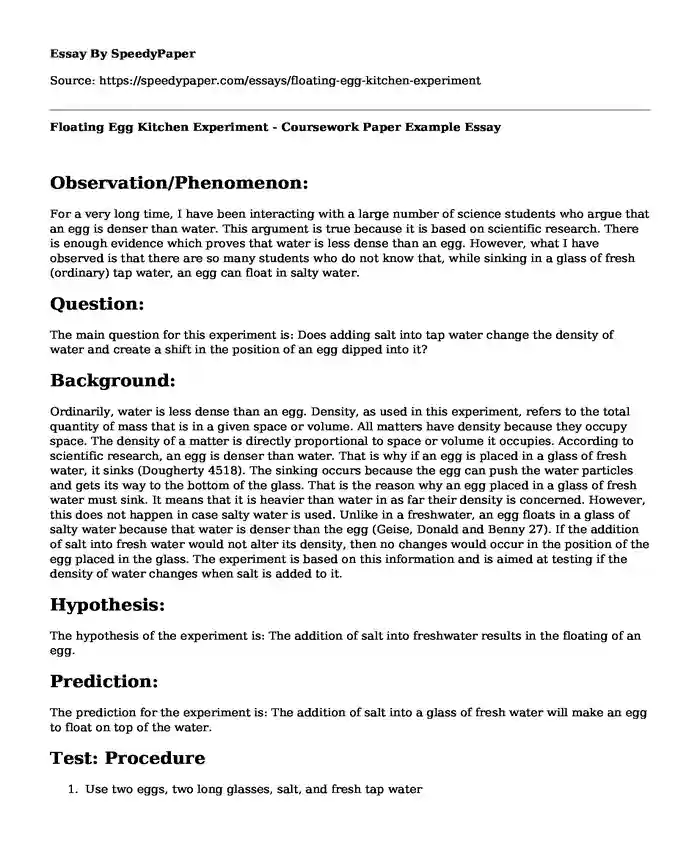Observation/Phenomenon:
For a very long time, I have been interacting with a large number of science students who argue that an egg is denser than water. This argument is true because it is based on scientific research. There is enough evidence which proves that water is less dense than an egg. However, what I have observed is that there are so many students who do not know that, while sinking in a glass of fresh (ordinary) tap water, an egg can float in salty water.
Question:
The main question for this experiment is: Does adding salt into tap water change the density of water and create a shift in the position of an egg dipped into it?
Background:
Ordinarily, water is less dense than an egg. Density, as used in this experiment, refers to the total quantity of mass that is in a given space or volume. All matters have density because they occupy space. The density of a matter is directly proportional to space or volume it occupies. According to scientific research, an egg is denser than water. That is why if an egg is placed in a glass of fresh water, it sinks (Dougherty 4518). The sinking occurs because the egg can push the water particles and gets its way to the bottom of the glass. That is the reason why an egg placed in a glass of fresh water must sink. It means that it is heavier than water in as far their density is concerned. However, this does not happen in case salty water is used. Unlike in a freshwater, an egg floats in a glass of salty water because that water is denser than the egg (Geise, Donald and Benny 27). If the addition of salt into fresh water would not alter its density, then no changes would occur in the position of the egg placed in the glass. The experiment is based on this information and is aimed at testing if the density of water changes when salt is added to it.
Hypothesis:
The hypothesis of the experiment is: The addition of salt into freshwater results in the floating of an egg.
Prediction:
The prediction for the experiment is: The addition of salt into a glass of fresh water will make an egg to float on top of the water.
Test: Procedure
- Use two eggs, two long glasses, salt, and fresh tap water
- Pour water into the first glass. Label it Glass One. The glass should be three-quarters full
- Pour water into the second glass and label it Glass Two. The glass should be three-quarters full
- Take six tablespoon-full of salt and add to Glass Two. Stir vigorously until the salt dissolves
- Dip an egg into Glass One
- Dip an egg into Glass Two
- Make observations on the position of the egg in each glass and record the findings
Possible Outcome:
The possible outcome for this experiment is that while an egg will be sinking in a glass of fresh water, it will float in a glass filled with salty water. This outcome confirms the hypothesis because the observation takes place as a result of the change in density of the water used in the experiment. The explanation is that the egg sinks in freshwater because it has a high density than it (Lin, et al. 2018). However, this position changes in salt water since the addition of salt increases the density of water to be higher than that of the egg that was initially denser.
Works Cited
Dougherty, Ralph C. "Density of salt solutions: effect of ions on the apparent density of water." The Journal of Physical Chemistry B 105.19 (2001): 4514-4519.
Geise, Geoffrey M., Donald R. Paul, and Benny D. Freeman. "Fundamental water and salt transport properties of polymeric materials." Progress in Polymer Science 39.1 (2014): 1-42.
Lin, Chuanlong, et al. "Experimental evidence of low-density liquid water upon rapid decompression." Proceedings of the National Academy of Sciences 115.9 (2018): 2010- 2015.
Cite this page
Floating Egg Kitchen Experiment - Coursework Paper Example. (2022, Aug 30). Retrieved from https://speedypaper.com/essays/floating-egg-kitchen-experiment
Request Removal
If you are the original author of this essay and no longer wish to have it published on the SpeedyPaper website, please click below to request its removal:
- Free Essay Sample on Historical Foundation of Aesthetics
- Free Essay on Preparing for Exams
- Whistle-blow Research in Our Free Essay
- Free Essay Sample on Indigenous Education in Australia
- Free Essay with the SWOT Analysis and the STP Analysis of Amazon Go
- Essay Example on the Greatest Threat to Humanity
- Aviation Next Generation Initiative, Free Essay Example
Popular categories





